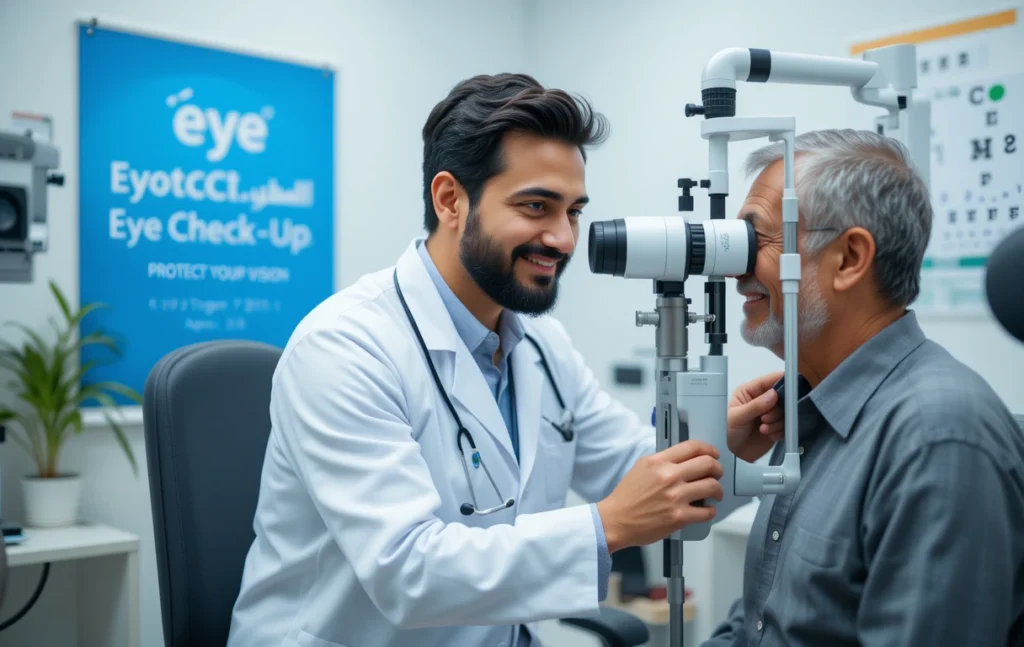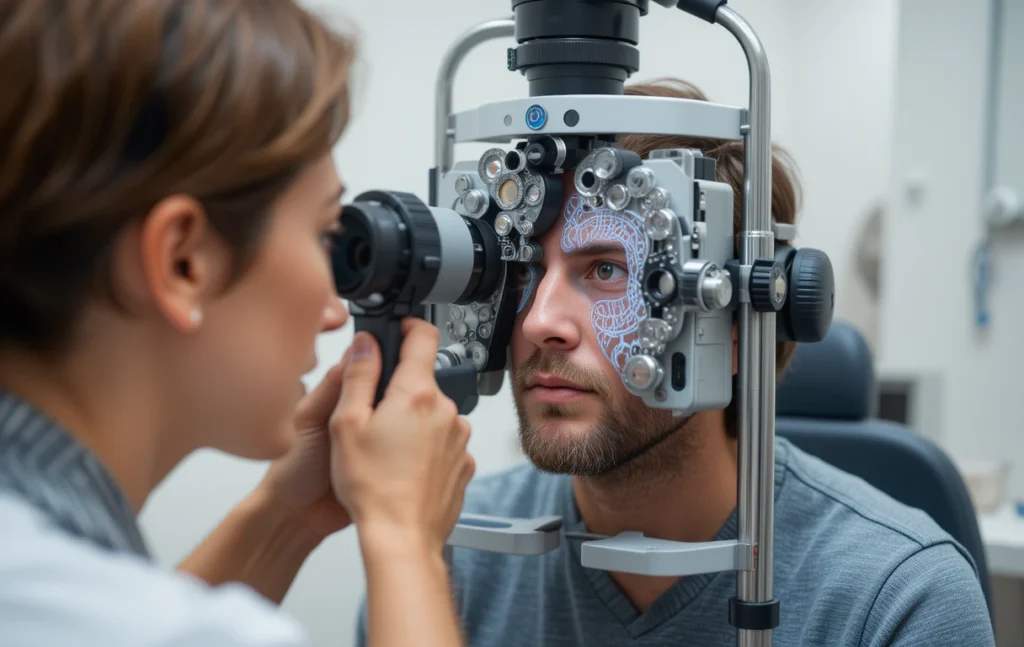
Did you know that over 50% of blindness cases in Pakistan could be prevented with a single visit to an eye specialist? From bustling cities like Karachi to rural areas of KPK, millions of Pakistanis risk losing their sight due to treatable conditions like cataracts and glaucoma. Regular eye check-ups are the key to catching these issues early and preserving your vision. This article explores why routine eye exams are critical for Pakistanis, how they can prevent vision loss, and practical ways to access affordable eye care, especially in cities like Karachi and Lahore.
The Growing Need for Eye Care in Pakistan
Pakistan faces a significant burden of vision-related issues. According to the Pakistan National Blindness and Visual Impairment Survey (2006), 51.5% of blindness cases in Pakistan are due to cataracts, and 7.1% are linked to glaucoma. With diabetes on the rise, diabetic retinopathy is also becoming a major concern. The Global Burden of Disease Study (2017) projects that conditions like presbyopia, refractive errors, and cataracts will continue to drive vision loss through 2025. These statistics highlight a critical truth: many eye conditions are treatable if caught early through regular eye examinations.
| Eye Condition | Prevalence in Pakistan | Source |
|---|---|---|
| Cataracts | 51.5% of blindness cases | Pakistan National Blindness Survey (2006) |
| Glaucoma | 7.1% of blindness cases | Pakistan National Blindness Survey (2006) |
| Refractive Errors | Common among schoolchildren | Latif et al. (2019), Professional Medical Journal |
| Diabetic Retinopathy | Rising due to diabetes | Nizamani et al. (2017), BMJ Open Ophthalmology |
These numbers show that eye health issues are widespread, yet many Pakistanis skip regular check-ups due to myths, cost concerns, or lack of awareness. Let’s break down why visiting an eye specialist is a non-negotiable step for protecting your vision.
Why Regular Eye Check-Ups Matter
Early Detection Saves Sight
Many eye conditions, like glaucoma and diabetic retinopathy, have no early symptoms but can lead to permanent vision loss if untreated. A routine eye test can catch these issues before they progress. For example, the Al-Shifa Trust Eye Hospital (2024) emphasizes that glaucoma screening during regular check-ups can prevent irreversible damage. By visiting an eye doctor, you ensure early intervention, which is critical in a country where access to advanced treatments like LASIK may not be suitable for everyone.
Addressing Common Myths
A common myth in Pakistan is that eye check-ups are only for those with obvious vision problems. However, conditions like refractive errors, which affect many schoolchildren in Lahore (Latif et al., 2019), often go unnoticed without professional screening. Another misconception is that eye care is expensive. In reality, programs like the Sehat Sahulat Program offer affordable or free eye care services, including cataract surgeries, for low-income families.
Protecting Against Environmental Risks
Pakistan’s dusty environment, UV exposure, and pollution increase the risk of eye infections like conjunctivitis, commonly known as pink eye. Learn more about the pink eye problem in Pakistan and actionable solutions. Regular visits to an eye clinic, such as Vision Plus Eye Care in Haripur, KPK, can help you adopt preventive measures, like UV-protective sunglasses, especially during summer. For more tips, check out Pakistan’s summer eye guide.
Overcoming Barriers to Eye Care in Pakistan
Cost Concerns
Many Pakistanis avoid eye exams due to perceived high costs. However, facilities like Vision Plus Eye Care in Haripur, KPK, offer affordable consultations, and community initiatives like free eye camps in Karachi (Akhtar Eye Hospital, 2024) make screenings accessible. The Sehat Sahulat program further reduces financial barriers by covering treatments like cataract surgery for eligible individuals.
Accessibility in Urban and Rural Areas
Urban centers like Karachi and Lahore have well-equipped eye clinics, such as Al-Shifa Trust Eye Hospital, where you can book an eye appointment online. Rural areas, however, face challenges. The Baig et al. (2020) study notes that community-based eye camps and mobile clinics are bridging this gap, bringing eye care services to remote regions.
Lack of Awareness
Many Pakistanis don’t realize the importance of eye health until it’s too late. Awareness campaigns by hospitals like Al-Shifa and initiatives like free eye check-ups in Pakistan are changing this. By prioritizing eye health tips, such as annual check-ups and UV-protective sunglasses, you can stay ahead of potential issues like pink eye or UV-related damage.
How Regular Eye Exams Work
A typical eye examination at a trusted eye specialist, like those at Vision Plus Eye Care, involves:
- Vision Testing: Checking for refractive errors like nearsightedness or farsightedness.
- Pressure Testing: Screening for glaucoma by measuring eye pressure.
- Retinal Examination: Detecting diabetic retinopathy or other retinal issues.
- General Eye Health: Assessing for infections or environmental damage, such as those caused by summer allergies (Pakistan’s Summer Eye Guide, 2024).
These tests are quick, non-invasive, and can be life-changing. For instance, Nizamani et al. (2017) found that community-based screenings for diabetic retinopathy in Hyderabad significantly reduced vision loss risks.
Practical Steps to Book Your Eye Appointment
Ready to prioritize your eye health? Here’s how to get started:
- Find a Local Eye Specialist: Search for “eye specialist near me” or visit trusted clinics like Vision Plus Eye Care in Haripur, KPK.
- Check for Free Eye Camps: Hospitals like Akhtar Eye Hospital in Karachi often host free screenings.
- Explore Government Programs: The Sehat Sahulat program can cover costs for eligible families.
- Schedule Online: Many clinics, including Vision Plus Eye Care, offer online booking for convenience.
- Prepare for Your Visit: Bring any medical history, especially if you have diabetes or a family history of eye issues. Not sure if treatments like LASIK are right for you? Read about whether your eyes are suitable for LASIK.
FAQs About Eye Check-Ups in Pakistan
Q: How often should I get an eye check-up?
A: Adults should have an eye exam every 1-2 years, or annually if you have diabetes or are over 40. Children should be screened every 2-3 years (Latif et al., 2019).
Q: Are eye check-ups expensive in Pakistan?
A: Not necessarily. Clinics like Vision Plus Eye Care offer affordable consultations, and programs like Sehat Sahulat provide free or subsidized care.
Q: Can regular check-ups prevent blindness?
A: Yes. Early detection of conditions like glaucoma or cataracts can prevent up to 51.5% of blindness cases in Pakistan (Jadoon et al., 2006).
Q: Where can I find a trusted eye specialist in Pakistan?
A: Reputable clinics like Vision Plus Eye Care in Haripur, KPK or Al-Shifa Trust Eye Hospital in Rawalpindi are great options.
Take Action: Book Your Eye Check-Up Today
Your vision is priceless, and a simple eye check-up can protect it for years to come. Don’t let myths, costs, or busy schedules stop you from seeing clearly. Whether you’re dealing with summer allergies or considering LASIK options, quality eye care is within reach. Take the first step toward better eye health by scheduling an appointment with Vision Plus Eye Care Haripur, KPK, Pakistan. Visit their website to book online or learn more about their services. Your eyes deserve the best—act now to safeguard your vision!



Comments are closed.